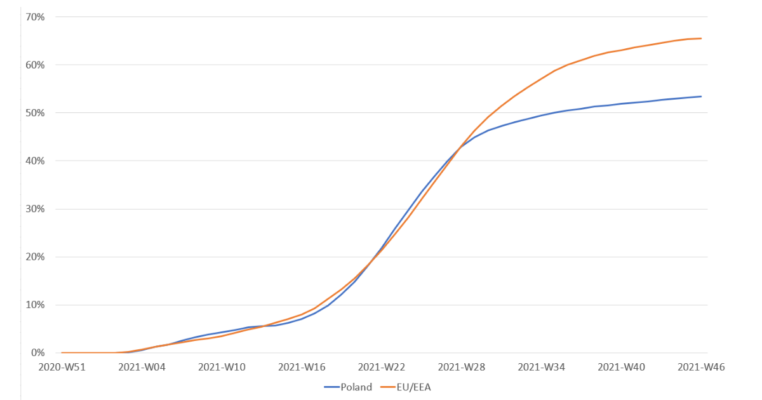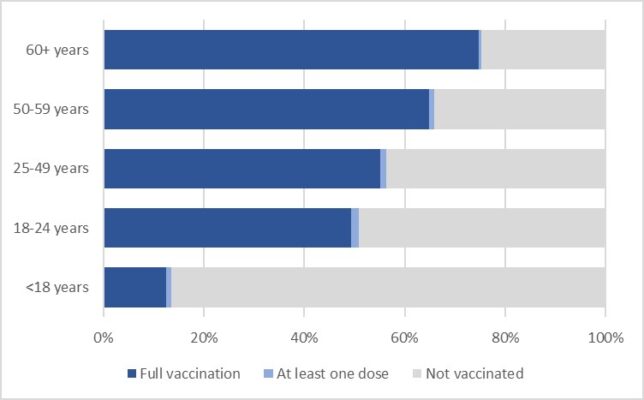Poland’s vaccination rate tracked the European trend until the middle of the summer when uptake plateaued earlier than the EU average. Today, 62% of adults in Poland are vaccinated while the EU has reached 76%.

Vaccine uptake is lower than the EU average in all age groups. However, while some European countries report high rates in older age groups with a decline among young adults, Poland is different: older people — who are at the highest risk — are opting out in large numbers.
The statistics are startling (source: ECDC Vaccine Tracker)
- > 80 years: 64% in Poland vs 89% in the EU
- 70-79 years: 84% in Poland vs 88% in the EU
- 60-69 years: 72% in Poland vs 85% in the EU

Access to vaccination is not a major problem. The vaccine is free, and the vaccination delivery system is on a par with other European countries. In any case, vaccine hesitancy has little to do with living in Poland: Polish people have low COVID-19 vaccine uptake rates, no matter where they live.
In Norway, for example, only 40% of Poles have received two doses of the COVID-19 vaccine, compared to 89% among the wider population. In Ireland, where vaccine uptake among adults is above 90%, data on people in Ireland from Eastern Europe (of which Poland accounts for the largest group) shows that 44% have had the vaccine. In the UK, research on essential workers from Poland suggests higher rates of vaccine hesitancy, leading many regions to run campaigns and events to engage with Polish communities.
This phenomenon predates the COVID-19 pandemic. Scottish research has highlighted the need to reach out to people from Poland who live in Scotland due to the significantly lower rates of HPV vaccine and flu vaccine uptake.
Indeed, it shouldn’t be surprising: as Prof Heidi Larson of the Vaccine Confidence Project pointed out in this 2010 interview. Concerns about vaccines spread beyond national boundaries through ‘trust networks’: people who leave their country of birth often remain plugged into social and media networks and retain these cultural links.
A long-standing problem
The risk of vaccine hesitancy in Poland was visible before the COVID-19 vaccine was introduced. Healthcare workers, seen as the most trusted source of information on vaccination for the general population, expressed lukewarm support for immunisation in a study conducted before the pandemic.
A survey of the wider population conducted in the summer of 2021, suggested one in three people in Poland aged 18-65 will never have the vaccine. Just 5% of this group said they were open to changing their minds with 27% declaring that nothing would change their minds. This implies that Poland’s current uptake of 62% is about as good as it will get, especially as other research carried out during the COVID-19 crisis showed similar results.
The reasons for this unwelcome phenomenon are many. Concerns about side effects or low levels of concern about preventable diseases partly explain the problem. However, these issues are present in every population.
Does Polish culture, at home and abroad, have higher levels of belief in conspiracy theories than elsewhere in Europe? Is the legacy of the communist era to blame for low trust in institutions, especially among older people?
Dr Tomasz Sobierajski of the Institute of Applied Social Sciences at the University of Warsaw says it all comes down to trust. ‘The biggest problem of low vaccination rates in Poland is the deficient level of trust in public institutions, including the government,’ he told Vaccines Today. ‘The Polish government has done much to undermine confidence in COVID-19 vaccination. The policy of universal vaccination was, and still is, chaotic. Above all, the government did not conduct a sufficient educational campaign broaden Poles’ knowledge about vaccination.’
It may be late, but Polish authorities are now running a nationwide initiative with 100 high-profile sporting figures, artists and social media influencers. The campaign presents vaccination as the last step required to get Poland back to normal.
A government information portal has been set up to provide information on vaccination and a lottery for people who register for vaccination. More than 3 million people have registered for the lottery and 10,000 gifts have been awarded. The well-established Szczepienia Info website, a member of the WHO Vaccine Safety Net, has also seen more than 1 million visits per month through 2021.
Viruses know no borders
Poland’s problems have implications for the rest of Europe. Although there are some EU Member States with lower vaccine uptake rates than Poland, it is the largest country with such a significant discrepancy from the EU average.
In addition, as EU integration offers greater freedom of movement between EU countries, millions of Poles take the opportunity to travel for long-term or short-term employment in other Member States. This means the uncontrolled spread of a respiratory pathogen in one country becomes a problem for the entire European community.
Unfortunately, the Polish experience shows that even the best designed social campaigns can struggle to counter vaccine skepticism that is deeply embedded in society. Trust in government and science play a key role in shaping attitudes to vaccination.
Dr Sobierajski says other countries have shown that high levels of vaccine uptake can be achieved even when starting from a low base. ‘To increase Poles’ confidence in vaccinations, it would be necessary to conduct an information campaign while introducing mandatory vaccinations or strict limitations for unvaccinated persons, following France, Italy, or Austria,’ he says. ‘However, taking into account that the voters of the ruling party are mainly unvaccinated people, it seems unlikely that such restrictions will be implemented in Poland.’
Like much of Europe, Poland is responding to a rise in cases of COVID-19 this winter while watching nervously for outbreaks of the novel omicron variant. Whether vaccination rates will rise in time to blunt the impact of the next wave, only time will tell.




Maria Gańczak
December 7th, 2021
Politicization of this epidemic and marginalization of experts as well as the lack of long kasting tradition regarding adult vaccination seem to be important driverze of vaccine hesitancy in Poland.
D.W
January 31st, 2022
I, as an unvaxed person visiting from the US, spent 4 months in Poland during Summer 2021, driving around visiting many different cities. I had the chance to speak with many Polish people about this. Their rationale for declining the vaccine was very reasonable to me, i.e. that the risk of death was very low compared to the unknown long-term effects of a basically untested and minimally-efficacious vaccine. The people of Poland are no strangers to difficult times, and you see that Polish people strive to be self-sufficient and independent. Like me, they seem to prefer to be responsible for themselves, are capable of making their own decisions, and they do NOT like to be told what to do. In this regard, I feel a close spiritual connection with Polish people and I absolutely love the country. I wish more people around the world took cues from the Polish.